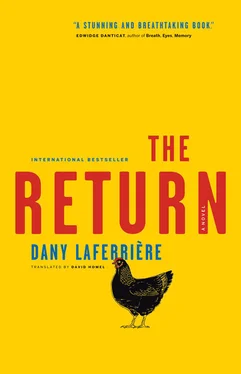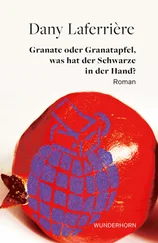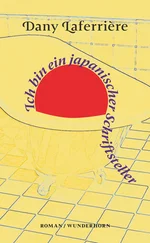My friend got shot in the hip at the casino
by an officer jealous of the way his wife
couldn’t take her eyes off him.
The story got into the papers.
The President offered him money.
His father refused.
The opposition wanted to make a hero out of him.
He refused.
I watch him concentrate all the energy
he can summon on the thing
that stokes his desire.
He begins to burn
when a girl in a short skirt
brushes against him not suspecting
the effect of such provocation
on a man in a wheelchair.
He can’t move his legs
but the organ in question
still seems quite alert.
I’m afraid to call the roll
to find out what state
my generation is in.
Some work for the government, others are in prison. Some vegetate, others live in luxury. Some still go in for seduction, others have aged prematurely. But those who never could leave the country and who always wanted to, feel, when they meet me again, that it’s up to a new generation to dream of that journey.
I went by the pharmacy and on the glass door there was a message scrawled on a piece of cardboard: “Closed for Funeral.” Diarrhea had kept me up all night. I couldn’t stop shitting, amazed once again at how much the belly can hold. The night before, I drank some fruit juice from a stall along my way, just to prove that I was still a son of the soil. Nationalism can trick my mind, but not my guts.
The young pharmacist with icy hands
recommended Buscopan
and amoxicillin three times a day.
Next door I bought a bottle of water
and began the treatment immediately.
I run to the hotel bathroom and settle in comfortably. I might be in for quite a stay. I look around and on the window ledge I discover an old issue of Historia that tells me everything about Himmler’s ascension through the Third Reich and the court rivalry, at the end, when they were done in like rats in the bunker. It was understood that the war was lost when Nazi officers started dressing without first taking a shower. I thought of my teenage years, when those stories fascinated me, which threw my mother into despair since she was scared silly of everything that had to do with politics in any form. Strangely she stopped worrying about me once I published my first article in Le Nouvelliste. It was a long literary commentary about Ficus, a novel that had just come out. In any other country, literary criticism would not have been a dangerous vocation, except for the risk of getting slapped by a parlor poet offended by some unflattering comment about his latest volume. But not in Haiti. My article provoked two reactions that were decisive for my career. The first came from Professor Ghislain Gouraige, the author of the monumental History of Haitian Literature (from independence to the present) that we studied in school, and who congratulated me for the originality of my opinions even as he pointed out a dozen errors of fact. That was followed the same day by a summons to the barracks of Major Valmé. According to established criteria, I had arrived.
My mother, trembling but determined, accompanied me to the office of the fearsome Major Valmé. I was exceedingly calm. The Major called for a coffee for my mother but did not allow her to attend the interrogation that was to be “a friendly conversation between two true lovers of literature.” My mother insisted, but the Major asked a non-commissioned officer to look after her. All this kind attention, instead of reassuring her, only increased her anxiety. But the conversation with the Major went well and did not go much beyond the subject of literature. As for the novel by Rassoul Labuchin, his opinion differed from mine. For him, Labuchin’s real project was not literary but political. Did I know that the author had spent time in Moscow? And that he was the confidant of the communist writer Jacques Stephen Alexis? In my opinion, General Sun, My Brother by Jacques Stephen Alexis is one of the most beautiful novels in Haitian literature. Quite spontaneously he replied that his preferences leaned toward Romancero aux étoiles. Mauriac was his favorite writer. Mauriac’s description of the bourgeoisie of Bordeaux reminded him of his own adolescence in the provinces. He ended the conversation by congratulating me on my “clear and readable style so unlike the usual Haitian manner.” I was impressed by the man’s elegance and culture, though I did not forget that he ran Papa Doc’s torture chambers. At times we heard screams coming from nearby rooms. Still, I continued to believe that literature would save me from all harm. On our return, my mother, too overwrought to ask me what was said in the office, took me out for a sandwich and a Coca-Cola and even wanted to buy me cigarettes. I wrote a literary column in the weekly Le Petit Samedi Soir until my colleague Gasner Raymond was murdered by the Tonton Macoutes on June 1, 1976, on the beach at Léogâne. I went into exile immediately afterward, in Montreal.
Learning of my intestinal misadventures
the hotel owner advises a rigorous diet.
I should stay in my room for the time being.
If only to be close to the bathroom.
Bored with the prison of my room,
I go down to the hotel bar.
A little TV perched on a shelf
is broadcasting the funeral of that young musician
killed last night in a car crash.
People are no longer used to
death by natural causes
if a spectacular collision
can be considered
as a natural not a political cause.
I read in the paper
that there were five of them in the car
but we’ll remember the one whose
fiancée killed herself when she heard the news.
To remain in popular memory
events must have brutal connections.
Love riding on death.
It’s true I pay attention only to the
apocalyptic images that cross my field of vision.
I don’t listen to rumors and I’m indifferent to ideology.
Diarrhea is my only involvement
in Haitian reality.
From time to time the old servant woman, not as old as the owner but more workworn, brings me a very bitter liquid to drink. The older the women are, the more unpalatable their remedies. The owner whispers to me to pour it down the sink and go on taking my medicine. She recommends rest — the country won’t disappear in a week. How can I explain to her that time has become an obsession for me? We are not living in the same time frame even if we are in the same room. The past, though it defines how we make sense of the present, does not have the same weight for everyone.
I turn in circles in this room.
My security perimeter
is shrinking ever smaller.
I’ll write a book about life
around the hotel.
A man by the hotel entrance
looks at me a while
though he can’t quite remember who I am.
He reminds me of someone too.
It takes us five minutes to
bring blurry images from the past to the surface.
To think we were inseparable at one time.
We smile, then say goodbye.
As if we had never seen each other.
The only way to preserve the little that’s left.
This narrow street
was a wide avenue
in my memory.
Only the thick bougainvillea bush
remains the same.
I used to hide behind it
to watch Lisa who
I was already in love with.
I notice that some details
change into emotion
depending on the color of the day.
I see yellow like a drunk man.
That’s the state of someone with a fever too.
I make myself a rum punch and lie down.
In the darkness, I feel a hand on my forehead.
I pretend to sleep.
Читать дальше












